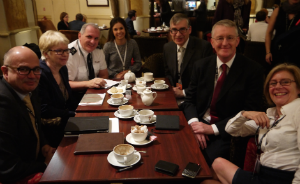The Free Churches and the MPs
It’s not only politicians, campaigners and the media who have a busy time at party conference season, writes Andrew Bradstock
 Leaders of the Free Churches were also among the faithful at the Labour, Conservative and Liberal Democrat conferences this year, making the most of the opportunity to meet with politicians before the general election.
Leaders of the Free Churches were also among the faithful at the Labour, Conservative and Liberal Democrat conferences this year, making the most of the opportunity to meet with politicians before the general election.
Representatives of the Baptist, Methodist and United Reformed Churches, the Salvation Army and the Society of Friends have been visiting party conferences for several years now, talking with MPs – including ministers – local councillors, MEPs and party activists.
They’re a very visible presence at these conferences, with their clerical collars, chains of office and uniforms – and deliberately so as they believe it’s important, especially at a time when politics has a bad name, to demonstrate their conviction that the political process is important and Christians and churches should be part of it.
They also want, through these visits, to affirm those who live out their vocation through political activity, and pray with Christians who are active within their parties.
The pattern at each conference was for the church leaders to meet with individual politicians to explore issues of mutual concern.
At the Labour conference in Manchester the delegation met with several shadow ministers and MEPs, raising with them issues such as gambling, credit unions, how to measure ‘well-being’ and the impact of the Scottish referendum.
In Birmingham the group met with Conservative MPs and councillors, discussing foodbanks and the causes of poverty; homelessness and the housing crisis; gambling and alcohol addiction; how Christians can advocate for peace in a conflict-ridden world; and ways that churches can engage with and influence politicians.
The Lib Dem conference in Glasgow saw the delegation discuss with several government ministers and peers issues as wide-ranging as localism, mental health, climate change, legal aid, immigration, the situation in Iraq and advertising payday loans on children’s television.
The churches also pressed their concerns about the implications of the Lobbying Act with politicians.
Faith and Society Team Leader Stephen Keyworth who, with North Western Baptist Association Transitional Minister Tim Presswood, represented Baptists Together at the conferences, said he was impressed with the willingness of politicians to engage with the churches, often at a deep level.
‘We had some very open and honest conversations about nitty gritty issues both at home and abroad’, Stephen said. ‘Politicians clearly think churches are worth talking with and want us to engage with them locally and nationally. And as one MP said to us, they also value our prayers for them.’
‘It was interesting to see how politicians view churches when we speak out’, Stephen continued. ‘Sometimes we need to recognise that issues are not always “black-and-white” but have “shades of grey”’, one senior MP told us.
‘And while we discussed specific issues like foodbanks and Iraq, we also glimpsed some of the values and ideals that drive politicians.’
As well as sharing concerns with parliamentarians and attending conference events, the delegations took part in prayer breakfasts hosted by the Christian groupings within each party.
These groupings also discussed with the church leaders how they seek to be a visible Christian witness within their respective parties, and the challenges this work presents.
The pattern in recent years has been for the church leaders to visit the same three party conferences, but the rapidly changing political landscape may prompt a re-think. Will next year see them attending the Green Party and UKIP conferences as well as the other three?
If the churches are serious about getting involved where the rubber hits the road it’s something they’ll need to consider.
Andrew Bradstock is the secretary for Church and Society at the United Reformed Church, and a member of the Joint Public Issues Team
Baptist Times, 10/10/2014